初中仁爱版英语八年级上Unit2
仁爱版八年级上册英语-Unit2:Topic2单词汇总+知识梳理
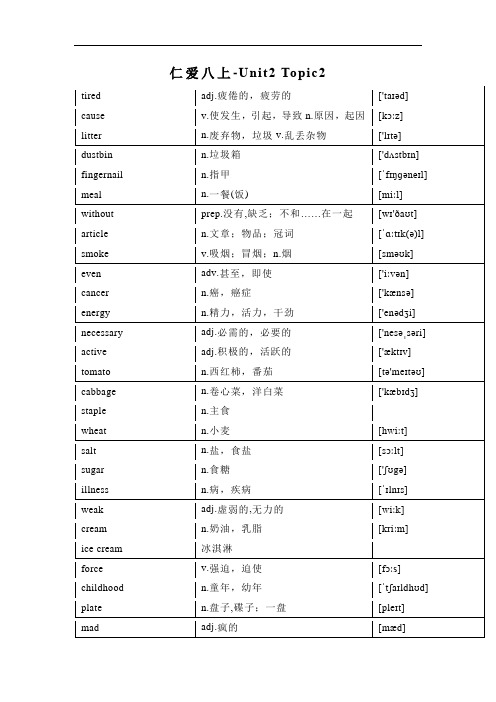
仁爱八上-Unit2 Topic2知识梳理【重点短语】1.stay up late 熬夜到很晚2.do morning exercises 做早操3.throw litter around 到处乱扔垃圾4.read in the sun 在太阳下读书5.in the newspaper在报纸上6.give up doing sth.7.show sth. to sb.=show sb. sth.8.It’s +adj.+ for sb. to do sth.对某人来说做某事……9.be careful not to do sth.小心不要做某事10.force sb. to do sth.迫使某人做某事11.leave for sp. 前往某地12.as soon as…一……就……13.get/be mad 发疯14.be surprised to do sth. 惊奇于做某事15.in fact 事实上16.as soon as possible 尽可能快的【重点句型】1.Staying up late is bad for your health.熬夜到很晚对你的健康有害。
2.I must have a good rest.我一定要好好休息。
3.You’d better not read in the sun.你最好不要在太阳下读书。
4.I must ask him to give up smoking.我一定让他放弃抽烟。
5.He thinks smoking can help him relax.他认为抽烟可以帮他放松。
6.It may even cause cancer.它甚至导致癌症。
7.May I borrow your newspaper and show it to my father? 我可以借你的报纸给我爸爸看看吗?8.How terrible!多么糟糕呀!9.It’s bad for your health.这对你健康有害。
仁爱版八年级英语上册-Unit-2-Topic-2-Section-A-课件(共32张PPT)

6. --I have a headache. ---___B___
A.I’m sorry to. B. I’m sorry to hear that. C. I’m sorry for D. I’m sorry.
7.--What’s wrong with Kangkang?
--He __A_____ tired.
□
□
7. going to school without breakfast
W__e__sh_o_u_l_d__h_a_v_e_b__re_a_k_f_a_s_t__b_e_f_ore we go to school.
□
□
8. brushing teeth twice a day
___________________________
1. 动名词作主语,谓语用第 三人称单数(be用is )的用 法。
2. Learn the modal verbs: 情态动词must/mustn’t.
1、抄写新单词 2、列举出五种对身体健康有 益的生活习惯。
单项选择: 1.—Which habit(习惯) is bad for
your health? —__B____
Yous_h_o_u_ld_n_’_t_/_m_u_s_t_n_’t(should/ shouldn’t)/
( must/ / mustn’t)smoke .
Because it __is__b_a_d___fo__r__our healh .
shouldn’t
He ____________(should/ shouldn’t)read in the sun.
仁爱版八年级英语上册 Unit 2 Topic 2 Section
仁爱版英语八年级上册单元知识点汇总第二单元
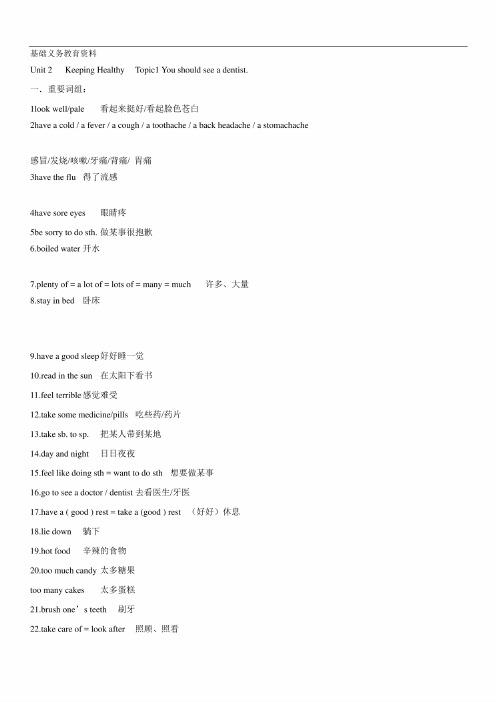
基础义务教育资料Unit2Keeping Healthy Topic1You should see a dentist.一.重要词组:Hook well/pale看起来挺好/看起脸色苍白2have a cold/a fever/a cough/a toothache/a back headache/a stomachache感冒/发烧/咳嗽/牙痛/背痛/胃痛3have the flu得了流感4have sore eyes眼睛疼5be sorry to do sth.做某事很抱歉6.boiled water开水7.plenty of=a lot of=lots of=many=much许多、大量8.stay in bed卧床9.have a good sleep好好睡一觉10.r ead in the sun在太阳下看书11.feel terrible感觉难受12.t ake some medicine/pills吃些药/药片13.t ake sb.to sp.把某人带到某地14.d ay and night日日夜夜15.feel like doing sth=want to do sth想要做某事16.g o to see a doctor/dentist去看医生/牙医17.h ave a (good)rest=take a(good)rest(好好)休息18.lie down躺下19.h otfood辛辣的食物20.t oo much candy太多糖果too many cakes太多蛋糕21.b rush one,s teeth刷牙take care of=look after照顾、照看22.take good care of=look after well好好照顾23.something new一些新的东西24.g o up上升25.fall down摔倒26.r un to sb.跑向某人run into sb,撞上某人27.with a cry/smile带着哭腔/微笑28.nothing serious没什么严重的29.r eturn to school重返校园30.t hree times a day一天3次31.h elp sb.(to)do sth.帮助某人做某事32.feel much better感觉好多了33.ask for one week,s leave(n.)请一周的假34.t hank sb.for sth.为某事感谢某人35.w orry about=be worried about为...担心36.follow the doctor,s advice/suggestions听从医生的建议37.g et well变好了,好转了38.h ave an accident发生事故39.d o sth.too much经常做某事40.n eed to do sth.需要做某事二.重要句型:IWhat,s wrong with you?=What,s the matter with you?你怎么了?21'm sorry to hear that.听到这件事我感到很抱歉。
初中英语 仁爱版八年级上册Unit 2 Topic 3知识点
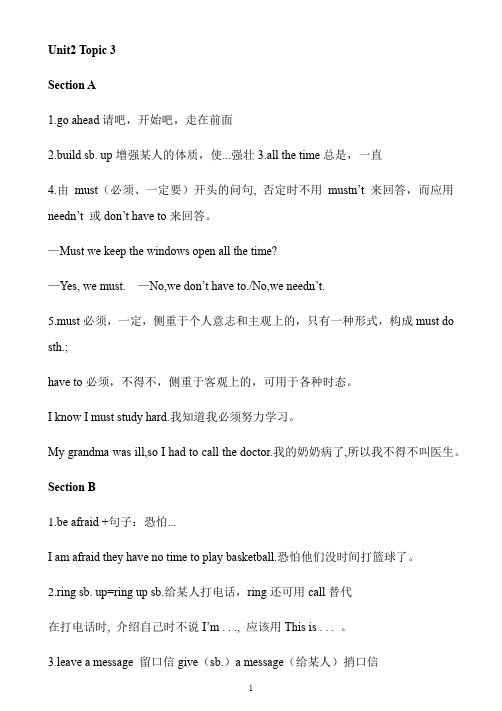
Unit2 Topic 3Section A1.go ahead请吧,开始吧,走在前面2.build sb. up增强某人的体质,使...强壮3.all the time总是,一直4.由must(必须、一定要)开头的问句, 否定时不用mustn’t 来回答,而应用needn’t 或don’t have to来回答。
—Must we keep the windows open all the time?—Yes, we must. —No,we don’t have to./No,we needn’t.5.must必须,一定,侧重于个人意志和主观上的,只有一种形式,构成must do sth.;have to必须,不得不,侧重于客观上的,可用于各种时态。
I know I must study hard.我知道我必须努力学习。
My grandma was ill,so I had to call the doctor.我的奶奶病了,所以我不得不叫医生。
Section B1.be afraid +句子:恐怕...I am afraid they have no time to play basketball.恐怕他们没时间打篮球了。
2.ring sb. up=ring up sb.给某人打电话,ring还可用call替代在打电话时, 介绍自己时不说I’m . . ., 应该用This is . . . 。
3.leave a message 留口信give(sb.)a message(给某人)捎口信take a message to sb.=give a message to sb.给某人传口信4.tell sb.to do sth.告诉某人做某事tell sb. not to do sth.告诉某人不要做某事The teacher tells us to clean the classroom.老师告诉我们去打扫教室。
仁爱版英语八年级上册Unit 2 Topic 2 重难点知识归纳总结
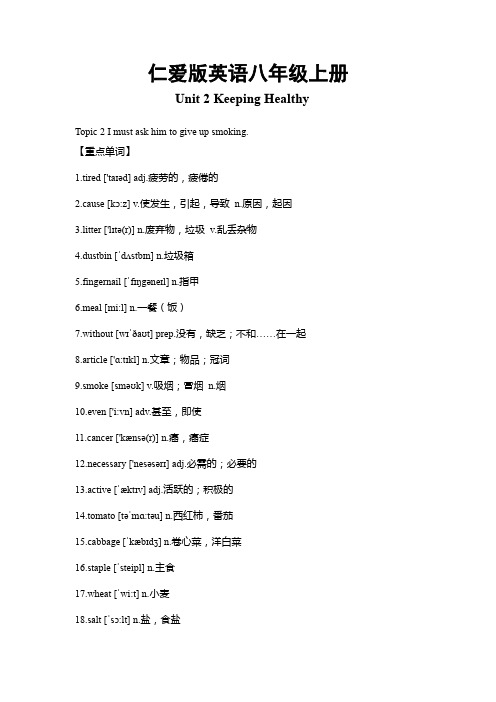
仁爱版英语八年级上册Unit 2 Keeping HealthyTopic 2 I must ask him to give up smoking.【重点单词】1.tired ['taɪəd] adj.疲劳的,疲倦的2.cause [kɔ:z] v.使发生,引起,导致n.原因,起因3.litter ['lɪtə(r)] n.废弃物,垃圾v.乱丢杂物4.dustbin [ˈdʌstbɪn] n.垃圾箱5.fingernail [ˈfɪŋgəneɪl] n.指甲6.meal [mi:l] n.一餐(饭)7.without [wɪˈðaʊt] prep.没有,缺乏;不和……在一起8.article ['ɑ:tɪkl] n.文章;物品;冠词9.smoke [sməʊk] v.吸烟;冒烟n.烟10.even ['i:vn] adv.甚至,即使11.cancer ['kænsə(r)] n.癌,癌症12.necessary ['nesəsərɪ] adj.必需的;必要的13.active [ˈæktɪv] adj.活跃的;积极的14.tomato [təˈmɑ:təu] n.西红柿,番茄15.cabbage [ˈkæbɪdʒ] n.卷心菜,洋白菜16.staple [ˈsteipl] n.主食17.wheat [ˈwi:t] n.小麦18.salt [ˈsɔ:lt] n.盐,食盐19.sugar [ˈʃugə] n.食糖20.illness [ˈɪlnəs] n.疾,疾病21.weak [wi:k] n.虚弱的,无力的22.cream [kri:m] n.奶油,乳脂23.ice cream 冰淇淋24.force [fɔ:s] v.强迫,迫使25.childhood [tʃaildhud] n.童年,幼年26.plate [pleɪt] n.盘子,碟子;一盘27.mad [maid] adj.疯的28.taste [teɪst] v.尝,品;吃n.味道29.surprise [səˈpraɪz] v.使惊奇,使诧异n.惊奇,惊讶30.watermelon [ˈwɔ:təmelən] n.西瓜31.potato [pəˈteɪtəʊ] n.土豆,马铃薯32.sandwich ['sænwɪdʒ] n.三明治(夹心面包片)33.strawberry ['strɔ:bərɪ] n.草莓34.beef [bi:f] n.牛肉35.biscuit [biskit] n.饼干36.such [sʌtʃ] pron.这样的,那样的,类似的37.etc [etsetərə] abbr.等等,以及其他38.fact [fækt] n.事实,真相;现实39.unhealthy [ʌn'helθɪ] adj.不健康的40.chemical [kemikl] n.化学品41.cigarette [sigəret] n.香烟,纸烟42.body ['bɒdɪ] n.身体43.disease [dɪˈzi:z] n.病,疾病44.harm [ha:m] v.&n.危害,伤害,损害45.smoker [sməʊkə] n.吸烟者46.second-hand adj. 二手的,旧的47.risk [risk] n.危险,风险v.(使)冒……的风险48.possible [pɔsəbl] adj.可能;能做到【重点短语】1.in fact 事实上,实际上2.as... as possible 尽量……地3.give up 放弃4.stay up late 熬夜5.be bad for 对……有害6.put... into... 把……放进……7.get up 起床8.be good for 有利于9.take a walk 散步10.have a bath 沐浴11.force sb to do sth 强迫某人做某事12.leave for 动身去,出发前往【重点句型】1.Staying up late is bad for your health. 熬夜对你的健康有害。
仁爱版八年级上册unit2知识点
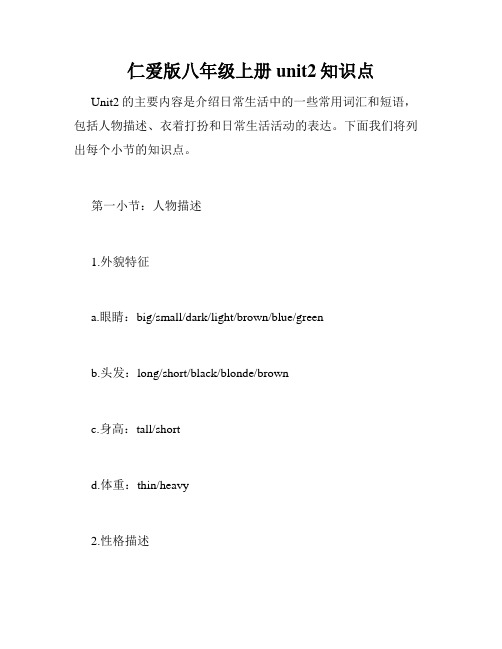
仁爱版八年级上册unit2知识点Unit2的主要内容是介绍日常生活中的一些常用词汇和短语,包括人物描述、衣着打扮和日常生活活动的表达。
下面我们将列出每个小节的知识点。
第一小节:人物描述
1.外貌特征
a.眼睛:big/small/dark/light/brown/blue/green
b.头发:long/short/black/blonde/brown
c.身高:tall/short
d.体重:thin/heavy
2.性格描述
a.开朗:outgoing/friendly
b.安静:quiet/shy
c.勇敢:brave
d.有礼貌:polite
第二小节:衣着打扮
1.上衣:T-shirt/sweater/shirt/blouse
2.裤子:jeans/pants/shorts
3.鞋子:sneakers/sandals/boots
4.配饰:necklace/bracelet/watch/earrings 第三小节:日常活动表达
1. 问路:Excuse me, can you tell me the way to...?
2. 看病:I feel sick. I need to see a doctor.
3. 看电影:Would you like to go to the movies with me?
4. 离开:Goodbye. Have a nice day.
本节重点:
1.掌握常用词汇和短语。
2.熟练应用词汇和短语,能够写出相关的句子和话题。
3.通过看图、听音等多种方式让学生掌握所学内容。
通过本节学习,学生可以扩展自己的词汇量和日常表达能力,从而达到更好的交流效果。
仁爱版英语八年级上册unit2知识点

仁爱版英语八年级上册unit2知识点仁爱版英语八年级上册unit2教学内容主要包括三个方面: 一、词汇;二、语法;三、句型。
一、词汇1. 颜色:红色 red, 黄色 yellow, 蓝色 blue, 黑色 black, 白色 white, 紫色 purple, 绿色 green, 橙色 orange, 粉红色 pink。
2. 衣着:帽子 hat, 外套 coat, 衬衫 shirt, 裤子 trousers/pants, 鞋shoes, 裙子 skirt, T恤 T-shirt, 运动服 tracksuit。
3. 食物:饼干 biscuit, 蛋糕 cake, 冰淇淋 ice cream, 汉堡包hamburger, 薯条 chips,面包 bread, 牛奶 milk, 面条 noodles, 炸鸡fried chicken。
4. 学科:地理 geography, 历史 history, 数学 maths, 音乐 music, 物理 physics, 外语 foreign language, 文学 literature。
二、语法1. 一般现在时:肯定句:主语+动词原形+s/es,如 He likes playing basketball.否定句:主语+does not/do not+动词原形,如 He does not like watching TV.疑问句:Does/Do+主语+动词原形?如 Does he like playing basketball?2. 连词and 表示并列,如 He is tall and handsome.or 表示选择,如 Would you like coffee or tea?but 表示转折,如 He is not rich but happy.3. 物主代词:my 我的, your 你的, his 他的, her 她的, its 它的, our 我们的, your 你们的, their 他们的。
仁爱版八年级上册英语-Unit2:Topic1单词汇总+知识梳理
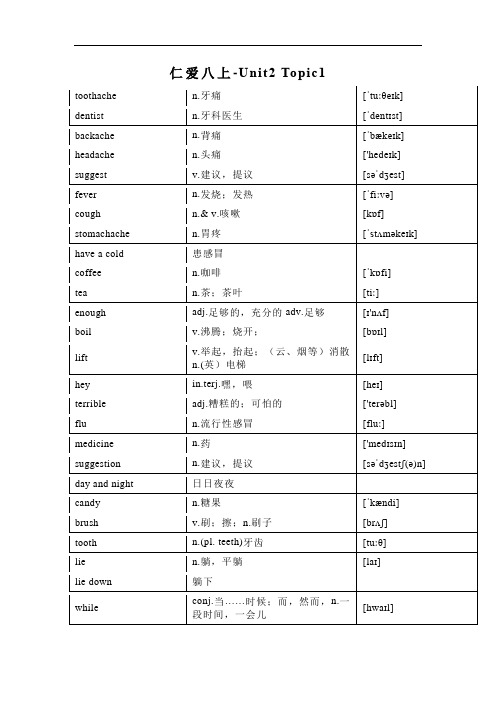
仁爱八上-Unit2 Topic1知识梳理【重点短语】1.have a toothache/backache/headache/stomachache 牙/背/头/胃痛2.see a dentist 看牙医3.have a cold 感冒4.have a fever 发烧5.have a cough 咳嗽6.have the flue 患流感7.drink enough boiled water 喝足够的开水8.stay in bed 呆在床上9.have a good sleep 有好的睡眠10.take some medicine 服药11.have a rest 休息12.day and night 日日夜夜13.lie down 躺下14.something new 一些新的东西15.fall down 摔倒16.three times aday 一天三次17.take care of/look after/care for 照顾18.ask for one week’s leave 请一周的假19.be worried about=worry about 担心20.follow/obey one’s advice 遵循某人的建议21.feel like doing sth.想要做某事=would like to do sth.=want to do sth.【重点句型】1.You don’t look well.你看起来气色不好。
2.--What’s wrong with you?你怎么了?--I have a toothache.我牙痛。
3.--What’s the matter with him?--He has a fever.4.I’m sorry to hear that.听到这我很难过。
5.You should see a dentist.你应该看牙医。
6.I hope you will get well soon.我希望你很快好起来。
- 1、下载文档前请自行甄别文档内容的完整性,平台不提供额外的编辑、内容补充、找答案等附加服务。
- 2、"仅部分预览"的文档,不可在线预览部分如存在完整性等问题,可反馈申请退款(可完整预览的文档不适用该条件!)。
- 3、如文档侵犯您的权益,请联系客服反馈,我们会尽快为您处理(人工客服工作时间:9:00-18:30)。
Unit 2 Topic 2第一部分基础知识运用(55分)Ⅰ.单项选择。
(10分)( )1.—Watching TV too much _______ bad for your eyes.—I’ll go to bed right away.A.isB.areC.wasD.be( )2.—If you feel _______, you should go to school.A.badB.worseC.betterD.good( )3.—How often do you exercise?—_______A.Less than three times a week.B.More than 10 hours.C.From one thirty to three.D.I often do it.( )4._______ necessary for us _______ English well.A.This is; to learnB.It’s; to learnC.It’s; learnD.That’s; learn( )5.If you eat _______ food and take _______ exercise, you’ll keep healthy.A.more; moreB.less; lessC.more; lessD.less; more( )6.—Humans can’t live _______ air.—I agree with you.A.withoutB.withC.inD.for( )7.—I can’t keep myself active during the day.—You _______ take more exercise.A.must notB.must beC.need toD.may be( )8.This article says _______ is bad for our lungs.A.smokeB.to smokeC.smokedD.smoking( )9.You had better ask your brother _______ pl aying computer games. It’s bad for him.A.to give upB.not to give upC.to give it upD.not give it up( )10.You _______ walk across the road. It’s dangerous.A.may notB.don’t have toC.must notD.needn’tⅡ.情景交际。
(5分)选择方框中的句子完成对话。
A:Which is more important, wealth or health?B:In my opinion (观点), 11 .A:I agree with you. But how can we keep healthy?B:I think 12 especially (尤其) green vegetables and fruit.A:Can we eat too much meat?B:No, I think 13 .A:What else should we do?B:We should 14 . But remember not to do sports soon after meals.A:I see. Is 15 for our health?ⅢDavid was a doctor. He spent 16 time in playing when he was in the medical college. Of course,he learned nothing. Later on he tried to find a 17 in the cities,but he failed. He 18 return to his hometown. It was 19 and there was only one hospital in it. He thought he knew much and looked down upon (瞧不起) his 20 . But soon the patients found he was not a good doctor 21 few asked him to look them over. He knew but he didn’t 22 .One day a traveler came into his office. The man caught a cold and wanted some 23 . David hoped to be paid more and looked over one of the traveler’s eyes 24 . “Oh dear!” called out Dav id, “You have a bad heart disease. You should be in hospital and only I can help you!”“Please 25 my right eye, sir,”said the traveler,“the left one is false (假的).”( )16.A.much B.a little C.no D.little( )17.A.doctor B.job C.hospital D.friend( )18.A.must B.should C.had to D.had better( )19.A.new B.big C.small D.beautiful( )20.A.parents B.patients C.friends D.workmates( )21.A.but B.and C.however D.because( )22.A.say B.fight C.believe D.mind( )23.A.money B.food C.drink D.medicine( )24.A.quickly B.carefully C.softly D.careful( )25.A.look at B.look for C.look after D.look likeⅣ.阅读理解。
(30分)(A)Mrs. White was very fat. She weighed (重) 100 kilos, so she went to see a doctor. The doctor said,“You need a diet (节食),Mrs. White, and I have a good way here.”He gave Mrs. White a small book and said,“Read this carefully and eat the things on page 11 every day. Then come back and see me in two weeks.”Mrs. White came again two weeks later, but she wasn’t thinner. She was fatter than before. The doctor was surprised and asked,“Are you eating the things on page 11 of the small book?”“Yes, doctor.”she answered.The next day the doctor visited Mrs. White during her dinner. He was very surprised at what he saw. “Mrs. White,” he said, “why are you eating potatoes and bread? They aren’t in your diet. ”“Doctor,”Mrs. White answered,“I follow my diet at lunchtime. But this is my dinner.”( )26.Why did Mrs. White go to see a doctor?A.Because she had a bad cold.B.Because she felt terrible.C.Because the doctor was her friend.D.Because she wanted to be thinner.( )27.The doctor asked her to _______.A.eat more foodB.eat less foodC.eat nothingD.eat healthy food( )28.After two weeks,Mrs. White became _______.A.Because she eat nothing.B.Because she was eating meat.C.Because she was eating potatoes and bread.D.Because she wasn’t in.( )30.What’s the meaning of “I follow my diet at lunchtime. But this is my dinner.”?A.She always followed the diet.B.She didn’t follow the diet.C.She didn’t like the diet.D.She only followed the diet at lunchtime, and she didn’t follow the diet at dinner.(B)You are what you eatKeeping better eating habits can help you reduce (减少) disease. A healthy eating plan means choosing the right foods to eat and preparing foods in a healthy way._______________________Do you often change your toothbrush? Maybe you think it is not necessary. A study shows old toothbrushes bring disease. You should often change your toothbrush.ExerciseSwimming, running, skating, skiing, dancing, walking and some other activities can help you stay healthy. You should exercise at least three times a week and for twenty minutes or more each time. Do it.Plan out your lifeYou should have breakfast before you go to school. Have a proper (合适的) meal for lunch. Follow a healthy diet.( )31.What’s the passage mainly about?A.Healthy food.B.Healthy lifestyle (生活方式).C.Junk food.D.Healthy sports.( )32.What is the best title (标题) for the second paragraph?A.Man’s diseaseB.DiseaseC.Watch the toothbrushD.Your bathroom( )33.At least how long should you exercise each time?A.Twenty minutes.B.Fifteen minutes.C.Five minutes.D.Ten minutes.( )34.From the passage, we know _______ can help us stay healthy.A.proper dietB.exerciseC.sleep and exerciseD.proper diet and exercise( )35.What does a healthy eating plan mean?A.Choosing the right foods.B.Cooking the foods in a healthy way.C.Never eat meat or fresh vegetables.D.Both A and B.(C)Ⅰ.Take the medicine with water. One pill every eight hours. For further nights,take two pills at bedtime. Don’t take more than six pills in 24 hours. For children six to twelve years old, give half the adult (成年人) dosage (剂量). For children under six years old, ask your doctor. Take less dosage if you can’t go to sleep.Ⅱ.Each pill of the medicine is taken three times each day for 14 years old. As usual, a pill 6:00 a.m. before breakfast,one before 11:00 and one before sleep. Not for children under six years old and old persons with heart trouble(疾病).Ⅲ.The medicine for a person with a cough. Two pills once a day before sleep for adults. Do not take the medicine without a cough. Half for children under 12 years old. Children with a bad cough, go to see a doctor.Ⅳ.Take the medicine three times a day. Five pills each time for an adult with a cold. Half the pills for children under 10 years old. Take the medicine before meals or before sleep.根据短文填空,每空一词。
